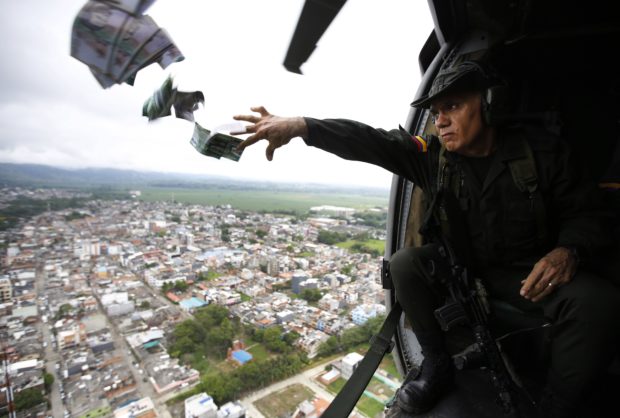Colombia police say closing in on top drug gang boss

Anti-narcotic Police Commander Gen. Jose Mendoza throws leaflets from an helicopter over Apartado, Colombia, Wednesday, May 31, 2017. The leaflets call for information regarding coca labs, members of Colombia’s largest illegal organization the Gulf Clan and information on those who have killed police officers. (AP Photo/Fernando Vergara)
Police are using Black Hawk helicopters to scour the green banana fields of northern Colombia in a newly intensified search for the country’s most-wanted drug boss.
With peace initiatives under way between the government and rebel groups, authorities are fighting on another front to stabilize the country after decades of violence: the gangs that make Colombia the world’s biggest source of cocaine.
Their top target is Dairo Antonio Usuga, alias Otoniel, leader of the country’s biggest drug gang, the Gulf Clan.
“We have him within striking distance,” says Jose Angel Mendoza, head of the anti-narcotics police division.
“He has had to run for it at the last second, more than once.”
Article continues after this advertisementUS reward offered
Article continues after this advertisementThe general spoke to AFP following search operations in the town of Apartado, where the force formally launched a major search operation on Thursday.
He gave out leaflets this week offering rewards for information about Usuga and his gang, and dropped stacks of them from a helicopter over the town.
The US State Department has offered a $5.0 million reward for Usuga’s capture on a 2009 indictment by a New York court.
In its profile of Usuga it calls his gang “a heavily armed, extremely violent criminal organization comprised of former members of terrorist organizations.”
It says “the organization uses violence and intimidation to control the narcotics trafficking routes, cocaine processing laboratories, speedboat departure points and clandestine landing strips.”
Paramilitary to drug lord
Usuga, 45, commands a force born from the remnants of an outlawed right-wing paramilitary group which fought rebels during the country’s half-century civil conflict.
The paramilitaries were officially disbanded in 2006, but authorities say their members are still making money from drugs and violence.
Fighting between the government and Colombia’s biggest rebel group, the left-wing FARC, has ended and the force is disarming under a peace deal.
But an accord still has not been struck with the last remaining rebel group, the leftist ELN. It is fighting the former paramilitaries for control of drug routes, officials say.
The Gulf Clan accounts for some 70 percent of Colombia’s cocaine production, police say.
The country produced 646 tons of the drug in 2015, according to the latest UN figures.
Rule of fear
Usuga has made the northwestern Antioquia region his stronghold.
“He became leader by inspiring fear, and it is out of fear that he is respected,” said Mendoza.
But now, he said, the police are close to tracking Usuga down even in this remote region.
Usuga uses messengers to communicate and changes location every three hours.
Police and the military have deployed 1,000 officers to hunt him, a police source said.
Police say they have killed 52 of the gang’s leaders this year, arrested more than 1,300 of its members and seized 90 tons of cocaine.
“What has most impeded the Gulf Clan is that its leaders are living in isolation so the security forces don’t find them easily,” Mendoza said.
“They have difficulty keeping in touch with their henchmen. The leadership is broken.” JPV